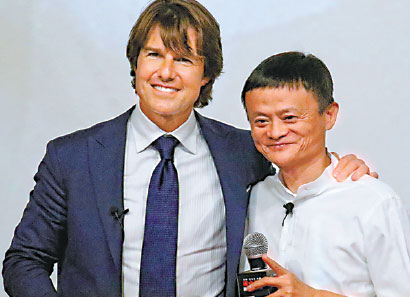Movies' Midas touch
Updated: 2015-10-02 09:02
By
Xu Fan
(China Daily)
|
|||||||||||
 |
|
Tom Cruise and Jack Ma, CEO of Alibaba, attend the Shanghai premiere of Mission: Impossible-Rogue Nation. China Daily |
"Stressed by inflation and rising living costs, people start to find that going to the movies has become an affordable, comparatively inexpensive form of entertainment," said Cheng, who predicts the 2015 box office will reach 42 billion yuan based on the titles to be released in the next three months.
"Having fun at the cinema can let people shake off worries over career struggles and daily life pressures, which may explain why comedy has become such a popular genre in recent years."
More screens
The growing number of theaters with multiple screens is regarded as another major factor in the booming market, according to Tan Fei, president of the Beijing film studio Eracme Entertainment, which has teamed up with a Hollywood company to produce the first English-language film based on China's traditional tale of the Monkey King.
"The rapidly growing number of screens combined with the expanding base of China's middle-class families is driving big growth," Tan said.
The country now boasts 28,000 screens in more than 5,800 cinemas, and more will be built in third- and fourth-tier cities. Insiders predict the screens will hit 50,000 by 2020, according to domestic media outlets.
Improved technology and the involvement of Internet giants in recent years have become strong supporting pillars for the industry, said Zuo Heng, deputy director of cinema studies at the China Film Archives.
Major Internet companies Baidu, Alibaba and Tencent have all established film arms and aim to form a complete chain from production to marketing and distribution.
Relying on their huge customer base, the cyberspace companies' strength is collecting big data to tailor films for targeted audiences. A slew of big-earning titles, such as the Tiny Times and Lost franchises, trace their commercial success to connections with large online fan bases and research into fans' preferences.
Some directors have begun to see themselves as production managers rather than artists, as hunting for box office success has become a primary task.
Most of the insiders worried that the box office domination index for judging movies will lead to "unhealthy" developments.
"After all, the movie industry is a business relying on creativity and innovation. When producers and directors concentrate on replicas of blockbusters, they may get lost in stereotyped characters and storylines," said Zhu Yuqing, director of the industry research department of the Chinese Association of Film Critics.
"That China will take over the United States to become the largest movie market in two years is a common view of industry insiders. But Chinese filmmakers should be alert and cautious," he said.
"Only the good tales and quality movies will survive the fierce competition."
Contact the writer at xufan@chinadaily.com.cn
Today's Top News
Russian aircraft in Syria violates Turkish airspace because of bad weather
Pacific trade ministers reach deal, doubt about approval remains
Typhoon leaves trail of death and mayhem
Chinese among trio to Nobel Medicine Prize
Islamic State militants blow up ancient Arch of Triumph in Palmyra
Japan seeks to 'block' application for Nanjing
Palace Museum's crackdown takes aim at visitor misbehavior
Typhoon Mujigae lashes southern China, at least four dead
Hot Topics
Lunar probe , China growth forecasts, Emission rules get tougher, China seen through 'colored lens', International board,
Editor's Picks

|

|

|

|

|

|






